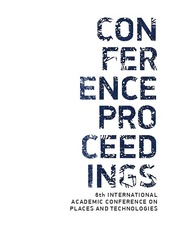Приказ основних података о документу
Upgrading urban mobility: the applicability of cycling apps in Banjaluka
| dc.creator | Milaković, Mladen | |
| dc.creator | Stupar, Aleksandra | |
| dc.date.accessioned | 2020-05-24T18:11:44Z | |
| dc.date.available | 2020-05-24T18:11:44Z | |
| dc.date.issued | 2019 | |
| dc.identifier.isbn | 978-963-429-401-6 | |
| dc.identifier.uri | https://raf.arh.bg.ac.rs/handle/123456789/767 | |
| dc.description.abstract | Although many European cities have already developed bike-centric urban transportation networks, labeled as highly sustainable, efficient and safe, the urban centers of Southeast Europe still have to embrace and implement this trend which demands a proper political, regulatory and planning setting. However, it should be underlined that bicycle transportation could have an important impact on the general state of environment, society, traffic and urban image, and as such, it could be used as a newly generated competitive advantage of SEE cities. The accelerated technological progress provides multiplying possibilities for development and upgrading, targeting different urban systems and networks. Bicycle transportation also uses the benefits of new technologies, which is especially important in cities which still do not have appropriately developed cycling infrastructure and need to adjust their urban features to the emerging cycling ecosystems. Considering the relationship between new trends of cycling in SEE cities and the evolving technological platform, the paper will focus on the case of Banja Luka (Bosnia and Herzegovina) and the application of two apps - bikecitizens i nextbike. The impact of these apps on urban mobility and cycling efficiency will be analyzed and evaluated, creating a starting point for the next phase of bike-friendly transformation of the city. The increased number of cyclists (stimulated by the use of these apps), as well as the modifications of (non)existing cycling infrastructure, would contribute to life quality, environmental awareness and the extended scope of professional knowledge targeting urban planning, design and decision-making. The selected case study of Banja Luka will provide an insight into actual implementation/use of cycling-friendly apps, enabling the elaboration of the existing and preferred patterns of urban mobility, while simultaneously defining the recommendations for further development of cycling networks. | en |
| dc.language.iso | en | sr |
| dc.publisher | Pécs : University of Pécs Faculty of Engineering and Information Technology | sr |
| dc.relation | info:eu-repo/grantAgreement/MESTD/Technological Development (TD or TR)/36035/RS// | sr |
| dc.rights | openAccess | sr |
| dc.source | Places and technologies 2019 : keeping up with technologies to turn built heritage into the places of future generations : conference proceeding : 6th international academic conference, Pécs, Hungary, 9-10 May 2019 | sr |
| dc.subject | Urban mobility | sr |
| dc.subject | Bicycle transportation | sr |
| dc.subject | Cycling apps | sr |
| dc.subject | Banjaluka | sr |
| dc.subject | Bike citizens | sr |
| dc.subject | Nextbike | sr |
| dc.title | Upgrading urban mobility: the applicability of cycling apps in Banjaluka | en |
| dc.type | conferenceObject | sr |
| dc.rights.license | ARR | sr |
| dcterms.abstract | Милаковић, Младен; Ступар, Aлександра; | |
| dc.citation.spage | 472 | |
| dc.citation.epage | 478 | |
| dc.identifier.fulltext | https://raf.arh.bg.ac.rs/bitstream/id/2127/PT_2019_CONFERENCE_PROCEEDINGSStuparA.pdf | |
| dc.identifier.rcub | https://hdl.handle.net/21.15107/rcub_raf_767 | |
| dc.type.version | publishedVersion | sr |

